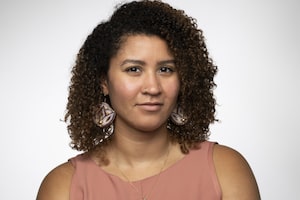A community event takes place outside Hagey Hall to focus on supporting one another and making everyone feel safe in Waterloo, Ont., on June 29, 2023.Nicole Osborne/The Canadian Press
Days after a classroom attack that injured a professor and two students during a philosophy and gender studies lecture at the University of Waterloo, scholars are rallying to denounce the violence and reiterate their commitment to academic inquiry.
But academics who study gender issues say they are at particular risk and have been a target of threats for years. Some are calling on universities to step up security on Canadian campuses.
Waterloo Regional police have said they believe Wednesday’s attack was motivated by hate. A 24-year-old Waterloo graduate and former international student has been charged with aggravated assault and assault with a weapon.
University of Waterloo stabbing during gender studies class driven by hate, police say
Three people stabbed during class at University of Waterloo
Shannon Dea, dean of arts at the University of Regina, said the incident feels particularly close to her because she created the course on gender and philosophy and taught it for years when she was at Waterloo.
In those days she received threats and harassment so frequently that campus security grew accustomed to filing reports, she said. That’s been the norm for those who teach gender-related courses for some time, she said.
But political developments in the U.S. have now made transgender issues a central target. As the rhetoric grows more heated, there’s a growing risk that lone-wolf attackers will be moved to action, Prof. Dea said.
“It is crucial that we continue to research, teach and learn about gender studies. But it is immoral for universities to put the onus on gender studies academic staff and students to bear the increased risk of violence,” Prof. Dea said. “No one should be afraid to enter a classroom.”
She added that in the coming weeks, university administrators should meet with police, campus security and others to ensure they have plans in place to ensure the safety of those who are studying and teaching these topics.
In an open letter published Friday, signed by more than 2,000 scholars, the Women’s and Gender Studies et Recherche Féministes association said it is horrified and enraged by the classroom attack. It called on Canadian universities to provide greater security and support for those studying these issues and those at risk of targeted violence.
Universities Canada, the umbrella group that represents nearly 100 Canadian schools, issued a statement Friday condemning the violence, and many universities and faculties issued similar statements.
Samantha Brennan, dean of the college of arts at the University of Guelph, said universities must stand up and support the researchers and teachers who are convening these important discussions.
“As an administrator I need to let them know I have their backs. I hate the idea that students would be afraid to speak up for fear of physical violence, or that faculty would change what they teach for fear of their own safety,” Prof. Brennan said.
She said institutions have to strike a balance between the traditional openness of universities with the need to keep people safe. She will be talking to staff, faculty and students to hear their concerns and let them know they have the university’s support, she said.
Miranda Green-Barteet, a professor and undergraduate chair of Gender, Sexuality, and Women’s Studies at Western University, said her faculty has already announced it would likely move up a safety audit originally planned for the fall. She said she will not change how she teaches, or what she teaches, but the attack has left her feeling wary.
“It may mean that I pay more attention to where the entrances and the exits in the classroom are,” she said.
Madison Trusolino, a PhD candidate at the University of Toronto, said she was horrified when she heard about the attack at Waterloo, but wasn’t surprised.
“There’s been so much aggressive transphobic, homophobic, sexist, misogynist rhetoric online that a lot of us have been concerned within feminist communities that something like this would happen,” Ms. Trusolino said.
Ms. Trusolino studies women and LGBTQ+ cultural workers. She said this aggressive online rhetoric has made many in her community scared to attend pride events or drag shows.
“A lot of people say it’s just online rhetoric, it’s just a joke,” she said. “But these are the real fears that people – women and LGBTQ people – are feeling on a regular basis.”
Rebecca Sullivan, a professor of gender and sexuality at the University of Calgary said she hasn’t felt safe in a classroom for a long time. She’s had to deal with threats and has made requests for security throughout her 20-year career.
“I have known that there is an extraordinarily higher risk for those of us teaching in Gender and Sexuality Studies programs,” Prof. Sullivan said.
The day after the attack at Waterloo, Prof. Sullivan and others in her department sent a letter to campus security asking for more security for their summer classes. She said the attack will change their approach to student safety.
“We must always have classrooms with two exits, and we may need to think twice about how and where and to what degree we post where our classrooms are,” she said.
 Joe Friesen
Joe Friesen Joy SpearChief-Morris
Joy SpearChief-Morris